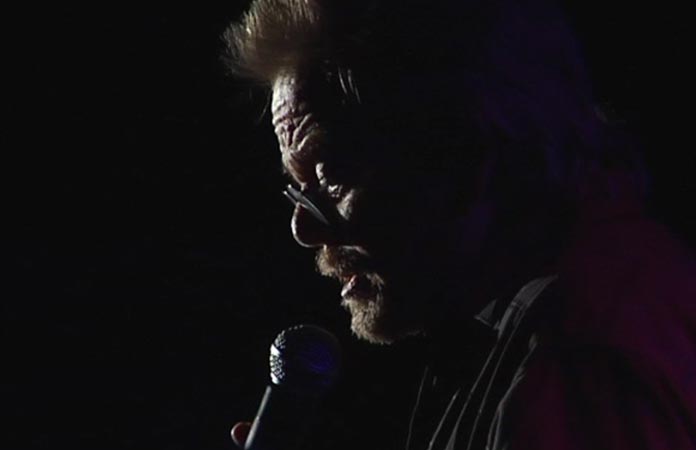DVD Review: Paul Williams: Still Alive
Published on February 25th, 2013 in: Current Faves, Documentaries, DVD, DVD/Blu-Ray Reviews, Movie Reviews, Music, Reviews |By John Lane

Bar none, one of the sweetest documentaries that anyone will view in a lifetime is Stephen Kessler’s Paul Williams: Still Alive, just released on DVD. The bar had been set extraordinarily high when 2010 saw the release of Who Is Harry Nilsson? (And Why Is Everybody Talkin’ About Him). After years of our culture pumping out salacious VH1 Behind-the-Music-style garbage about musicians, I had all but assumed intimate portraits with heart were doomed. The Nilsson documentary restored my faith that an honorable rendering could be done; Kessler’s film on musician/entertainer/actor Paul Williams solidifies that feeling for good.
Stephen Kessler was a child of the ‘70s, as was I. The documentary kicks into gear by noting how Paul Williams was a ubiquitous voice and presence in that era. Radio pumped out songs that he’d co-written (with Roger Nichols) for The Carpenters; we turned on the television, and there he was being interviewed for the umpteenth time by Johnny Carson; we went to the movies, and Williams was an ape in the Planet of The Apes series; we went back to the movies a little later, and heard his “Rainbow Connection” in The Muppet Movie. For a child at that time, Paul Williams appeared as a mysterious enigma—eternally child-like in appearance due to his diminutive stature, and sporting a shaggy haircut. Whether we could articulate it or not, Williams had a Pied-Piper aura. He just seemed always…there, and we assumed he had always been there and would continue to be forever.
Kessler’s documentary picks up at the beginning, for my generation, then wonders where Williams had gone to when his omnipresence mysteriously evaporated in the late ‘70s/early ‘80s. In short, Williams had burned himself out on drugs and alcohol, and whatever magical momentum he had generated over the course of a decade just went poof. Kessler contemplates the obvious disparity between that guy who had the whole world on a string (e.g., photos with Sinatra, rubbing elbows with Carson, hugging a bunch of Muppets) versus the re-born guy who was now playing humble gigs in Winnipeg and the Philippines.
When Kessler does veer perilously close to asking his hero, “What the hell happened?” (but never in those words), Williams visibly bristles, but not because he’s ashamed or rueful of “all those millions” having slipped through his fingers. Oh, on the contrary, for Paul Williams is genuinely warm, self-effacing, and humble. For if Williams is acutely aware of what he’s lost, it’s time: time that he could have better spent as a responsible father and husband. So what we’re left with is not a “the show must go on” attitude (as that’s too simple and clichéd), but rather a “life must go on” mentality.
There are numerous emotional dividends in this documentary for the viewer, all of which are tender and poignant. To point them all out here would be like spoiling the surprise of a birthday gift. But I will indulge in one: At the film’s end, Kessler—himself a child at heart, just like his hero—is granted a “sleepover” at Williams’s house (and Kessler actually calls it “a sleepover”!).
What we see is a rather middle-class home. Williams doesn’t have a gigantic studio in his house, doesn’t have a polished shiny grand piano; he’s got a keyboard, not very big, right next to his humble computer in his small office. His “creative space” looks like countless other spaces you’ve seen reflected in videos on YouTube by amateur/aspiring/non-famous musicians who record and film at home. There are a couple of bottles of soda sitting on a sideboard in a small kitchen; there’s his wife wearing rubber yellow gloves as she cleans some dishes; and then we see Kessler, cozy as a kid at a sleepover with his best friend, and he takes a quick moment to film himself at the sleepover. We see big kid plopped down in a chair as Williams noodles on a keyboard, and Kessler has kicked off his shoes. The comfort, the security, and the warmth of that moment reflect the big-hearted, innocent nature of this documentary as a whole, and reflect that same nature in its subject.
When the film ends, it’s literally a feeling of wishing that it had continued for at least another hour. We’re not left with the question, “Gosh, is Paul Williams going to be OK?” for we know the answer: he’ll be just fine. And the viewer will want to watch this documentary again to be bathed in that reassurance about Williams and somehow about ourselves, too.
Paul Williams: Still Alive was released by Virgil Films & Entertainment and Brainstorm Media on February 5. You can order the film directly from the Paul Williams: Still Alive website.
One Response to “DVD Review: Paul Williams: Still Alive”
February 25th, 2013 at 12:27 pm
I love Paul Williams………should know that you cannot write songs like Paul; without having a heart and soul to match……he is an ICON!!!!
Time limit is exhausted. Please reload the CAPTCHA.